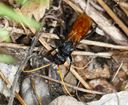Entypus
Entypus
Classification
- Phylum: Arthropoda
- Subphylum: Hexapoda
- Class: Insecta
- Order: Hymenoptera
- Superfamily: Pompiloidea
- Family: Pompilidae
- Subfamily: Pepsinae
- Tribe: Pepsini
- Genus: Entypus
Pronunciation
How to pronounce Entypus: //ˈɛntɪpəs//
These audio files are automatically generated. While they are not always 100% accurate, they are a good starting point.
Images






Summary
Entypus is a genus of spider wasps in the family Pompilidae, consisting of medium to large species that inhabit open areas. They are known for their nesting behavior utilizing spider prey and possess a range of physical characteristics based on species-specific traits.
Physical Characteristics
Medium to large wasps, most exceed 20 mm and some may attain lengths of almost 30 mm.
Identification Tips
Characterized by variations in antennal and wing coloration, and separation of species groups based on these traits.
Habitat
Open areas, woodland edges; never found in deep woods.
Distribution
Practically transcontinental; individual species have restricted ranges, for example, E. fulvicornis is primarily eastern, while others like E. texanus are found more in western regions.
Diet
Adults frequently visit flowers, especially umbellifers and Solidago spp.
Life Cycle
One generation per year in most of the US; found later in the season (late summer-early autumn).
Reproduction
Adults provision a pre-existing cavity (or modification of a pre-existing cavity) generally with a Lycosid spider, though similar families like Agelenids may also be reported.
Ecosystem Role
As spider wasps, they play a role in controlling spider populations and pollinating flowers.
Collecting Methods
- Netting adults near flowers
- Trapping using baited traps
Preservation Methods
- Pinning specimens
- Storing in alcohol
Similar Taxa
Tags
- Entypus
- Hymenoptera
- wasps
- spider wasps